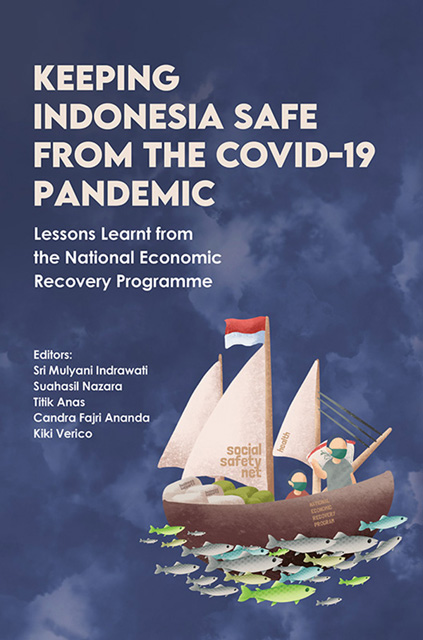 Keeping Indonesia Safe from the COVID-19 Pandemic
Keeping Indonesia Safe from the COVID-19 Pandemic Published online by Cambridge University Press: 30 June 2023
INTRODUCTION
The first year of the COVID-19 pandemic and the subsequent measures to contain its spread have magnified existing burdens on women and people living with disabilities in G20 countries and around the world.
This period has been referred to as a “Shecession” or “Momcession” because larger employment penalties were borne by women across advanced and emerging countries, particularly when schools and childcare facilities shut down (Bluedorn et al. 2021; OECD 2021). McKinsey (2020) estimated that women made up 39 per cent of global employment before the pandemic hit but took 54 per cent of the job losses. Women gave up paid work faster than men due to increased family responsibilities during the pandemic.
Beyond impacts on employment and unpaid work, women and girls also endured more domestic violence as the poor economic and social conditions coupled with lockdown measures exacerbated existing abuse and control (Gavrilovic et al. 2022). Besides being devastating to individual well-being, such violence takes a heavy economic toll (Oedraogo and Stenzel 2021; UN Women 2020a). With the pandemic and its impact on women, the World Economic Forum estimates that it will take an additional generation to close the large gender gap that prevailed even prior to the pandemic.
Concurrently, in regular circumstances, people with disabilities—which comprise 15 per cent of the world's population—are more exposed to economic insecurity and shocks because they are more likely to be poor and have higher health costs, and have lower levels of education and economic participation (UNPRPD, UNICEF, IDA, and ILO 2020). People with disabilities also have more healthcare needs than others and are therefore vulnerable to the impact of low-quality or inaccessible healthcare services (WHO 2020).
A consensus is building that social protection is a key policy response to address pandemic-related social and economic crises, and that timely action can counter the trends. McKinsey (2020) suggests taking timely action to advance gender equality could add US$13 trillion to the global gross domestic product (GDP) in 2030 compared with a situation where no action is taken.
However, by July 2021, out of 3,099 social protection and labour market measures worldwide, only 19.6 per cent took gender into account because existing systems were inadequate for considering gender within shock-response planning.
To save this book to your Kindle, first ensure [email protected] is added to your Approved Personal Document E-mail List under your Personal Document Settings on the Manage Your Content and Devices page of your Amazon account. Then enter the ‘name’ part of your Kindle email address below. Find out more about saving to your Kindle.
Note you can select to save to either the @free.kindle.com or @kindle.com variations. ‘@free.kindle.com’ emails are free but can only be saved to your device when it is connected to wi-fi. ‘@kindle.com’ emails can be delivered even when you are not connected to wi-fi, but note that service fees apply.
Find out more about the Kindle Personal Document Service.
To save content items to your account, please confirm that you agree to abide by our usage policies. If this is the first time you use this feature, you will be asked to authorise Cambridge Core to connect with your account. Find out more about saving content to Dropbox.
To save content items to your account, please confirm that you agree to abide by our usage policies. If this is the first time you use this feature, you will be asked to authorise Cambridge Core to connect with your account. Find out more about saving content to Google Drive.